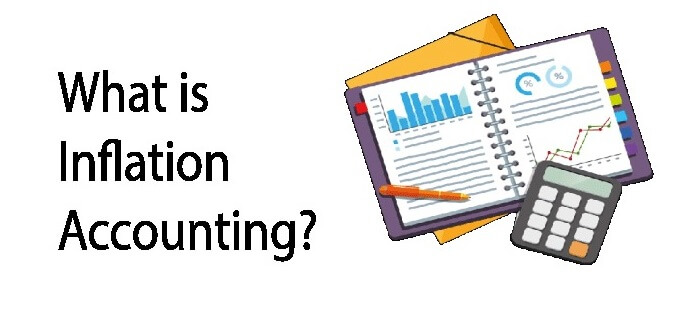Advantages And Disadvantages Of Inflation AccountingThe decline in purchasing power of households over a certain period is termed inflation. Here the households face a situation where the rate of increase in prices of goods is greater than the rate of increase of income. However, inflation is also an opportunity to expand production capacity to meet excess demand before the sharp increase in prices of the commodities.  In inflation, households are forced to reduce their demand, creating a disequilibrium between demand and supply. Hence, inflation negatively impacts the growth rate of an economy. In such a scenario, economists face trouble in the computation of GDP and the rate of growth of the economy. Inflation AccountingInflation accounting helps to compute a fair value financial position. With the help of inflation accounting, economists can obtain an accurate assessment of financial statements. Using this process, it becomes easy to adjust depreciation and sharp price changes with the help of tools such as the current price index. The process of inflation accounting is complicated. It reflects the financial values and helps to obtain a reasonable understanding of the financial position of the economy or even companies. However, inflation accounting is a complicated and expensive process. Since the overall process of inflation accounting is subjective and complex, it can only be computed by an expert economist or analyst. However, it helps to create efficient financial reports which are useful for further analysis. Hence, inflation accounting helps economists to analyze statements and scenarios more efficiently. Need For Inflation AccountingInflation accounting is essential for companies as it helps to compute a fair view of the balance sheet and other financial statements. This process helps to analyze accurate values and generate true reports. These reports can be adjusted as per the price changes such as inflation and depreciation. This process of financial adjustments is complex and lengthy. Since inflation accounting is expensive, theoretical, and subjective, an expert must process this complicated accounting model. Hence, inflation accounting is used to adjust price changes according to economic fluctuations and generate accurate and reasonable financial reports.  Inflation Accounting MethodsTwo common methods are used for inflation-adjusted accounting. These methods help the analysts compute more meaningful conclusions from the historic financial statements. Making such historic data meaningful by the current price index and international standards is essential. This helps to update the data and make it meaningful according to the current aspects of the economy. These methods are crucial as they help analyze financial statements efficiently and allow the analyst to draw meaningful conclusions. Hence, using these methods makes it possible to analyze inflation-adjusted financial statements efficiently and effectively. Hence, it is essential to consult an expert financial analyst to analyze inflation-adjusted financial statements more efficiently and draw meaningful conclusions. This would make the whole process more efficient and effective. Current Purchasing PowerHere a separation is created between monetary and non-monetary items to carry out inflation-adjusted accounting more efficiently and effectively. This allows the analyst to record losses or gains on items more efficiently which are of a specified monetary value. However, the items with a variable cost or that don't have a fixed price are updated using an inflation conversion factor. The inflation conversion factor is equivalent to the consumer price index. Hence, the current purchasing power methods help the analyst calculate the prices of both monetary and non-monetary goods. These goods' prices are calculated per the consumer price index. It is essential to consult an expert financial analyst to analyze inflation-adjusted financial statements more efficiently and draw meaningful conclusions. This would make the whole process more efficient and effective. Current Cost AccountingThis method allows the analyst to value any asset as per their fair market value. Here the cost is not calculated on historical prices. Rather the prices are restated to the current values of the specific goods. Both monetary, as well as non-monetary goods are included in this method. The current cost accounting method is preferred by analysts when they wish to obtain the fair value of any certain good. Hence, this method helps an analyst to find more meaningful conclusions. The current cost accounting methods help analysts examine monetary and non-monetary goods. This specific method helps to analyze inflation-adjusted financial statements more efficiently and effectively. It is essential to consult an expert financial analyst to analyze inflation-adjusted financial statements more efficiently and draw meaningful conclusions. This would make the whole process more efficient and effective. Advantages Of Inflation AccountingVarious benefits are realized from inflation accounting. It helps to compute a fair and true representation of the financial statements, such as the balance sheet. The adjusted figures help to compare profits more efficiently. Inflation accounting works as an effective means to analyze errors and helps to check on misleading data. The process of inflation accounting is complicated. However, it helps to create efficient financial reports which are useful for further analysis. Hence, inflation accounting helps economists to analyze statements and scenarios more efficiently. Realistic Report Generation Inflation accounting helps analysts to generate financial reports which are accurate and helps to obtain a realistic view of profitability and other related financial reports. This report-generation process helps analysts create more efficient and effective financial reports with adjustments for inflation and depreciation. Hence, inflation accounting is essential as it helps to obtain accurate financial reports. Analysts use inflation accounting to analyze financial statements and reach conclusions more efficiently. Adjustment Of Depreciation Inflation accounting is not only beneficial for adjustments related to inflation, but it is also useful for the treatment of depreciation. Financial reports are extremely complex, and slight price changes create a huge impact on financial reports. Hence, the process of inflation accounting helps analysts to make adjustments related to depreciation along with inflation. The process of inflation accounting is complicated. However, it helps to create efficient financial reports which are useful for further analysis. Hence, inflation accounting helps economists to analyze statements and scenarios more efficiently. Crosscheck Over Errors Inflation accounting helps analysts to find errors, and this helps the analysts to make rectifications more efficiently. The overall process of error rectification is complex and time taking. Hence, the financial adjustment of error is essential for analysts as it helps to take more efficient financial decisions. Inflation accounting is a complicated process and it helps to analyze errors efficiently. Inflation accounting helps to rectify errors and take corrective measures efficiently. Avoidance Of Overstatement With the help of inflation, accounting analysts and auditors can avoid missing, under-recording, or over-recording financial statements. This helps to analyze and evaluate the actual financial position of the business. Here the price index plays an essential role. In inflation accounting, the current price index plays a crucial role. The current price index helps to determine a realistic position for adjusting financial statements. Hence, inflation accounting helps accountants to avoid errors of under-recording or over-recording financial statements. Since inflation accounting is an expensive and complicated process, it is essential to perform it efficiently to obtain accurate results. Comparison Of Profitability Financial analysis includes a comparison of profits and financial statements yearly and quarterly. When financial statements are analyzed and compared on quarter to quarter basis, the rate of inflation is usually less, and it doesn't impact the financial analysis. However, if the analysis is made on a year-to-year basis, then the inflation rate is crucial. Here, the current price index and inflation-adjusted accounting would help the analyst to determine a fair and accurate picture of the profits. With the help of inflation-adjusted accounting calculation of financial statements on historic data becomes more efficient and accurate. Hence, inflation-adjusted accounting helps to portray a clear picture of the company's financial statements. Disadvantages Of Inflation AccountingInflation accounting is among the most essential and crucial steps of financial accounting. However, the overall process of inflation accounting could be simpler and more lengthy. This makes inflation accounting a very time taking process. Moreover, analyzing these adjusted statements is complicated; only experts can analyze such data. Since the process of inflation accounting is time-consuming and complicated, it involves more resources and is an expensive technique. However, despite being expensive inflation-adjusted accounting is highly efficient. Never-Ending Process Inflation accounting is one of the essential steps of financial analysis. However, the actual process of analyzing the price change is a process that takes time. Since the price change will continue for an infinite time, it becomes impossible to adjust these statements at every single point in time. Hence, these financial statements are updated at specific time intervals. Inflation-adjusted accounting is among the longest and most time involving processes of financial analysis. However, it is among the most efficient tasks, making financial statement analysis much more efficient and effective. Complicated Process Perform inflation-adjusted accounting is not possible for a common person. Analysis of inflation-adjusted statements requires going through historic data that must be compared with present data. Only an expert can analyze such data and derive meaningful conclusions from such statements. Hence, the process of inflation-adjusted accounting is very complicated and involves a huge amount of time and financial resources. Inflation-adjusted accounting is a crucial process. However, it involves a lot of time and a huge amount of financial resources. Only an expert analyst can analyze such data and derive meaningful conclusions. An expert analyst can only perform the process of inflation-adjusted accounting. Expensive Process The process of inflation adjustment accounting is a complicated and expensive activity. Since the overall process of inflation accounting is a time-consuming and complicated process that an analyst can only perform, so it is an expensive process. However, the return generated on this investment is high. Since inflation-adjusted accounting is expensive, small enterprises need help to afford it. Hence, this technique is usually used by large and well-established businesses. Inflation accounting is a crucial process for effective and efficient analysis of financial statements. However, it is an expensive process. Hence, it is essential to do a proper financial analysis before investing in such expensive activities. Theoretical Concept The process of inflation accounting is a purely theoretical concept. The process involves multiple theories and techniques which are crucial for the analysis of financial statements. Hence, having an expert with full-fledged theoretical knowledge of analytical concepts is essential. With theoretical knowledge, it is possible to perform an efficient financial analysis of the statements. Professional analysts can only process the implementation of such theoretical aspects of accounting. Hence, it is essential to consult a professional analyst or accountant with proper theoretical knowledge for the best analysis of inflation-adjusted financial statements. It is essential to consult an expert financial analyst to analyze inflation-adjusted financial statements more efficiently and draw meaningful conclusions. This would make the whole process more efficient and effective. ConclusionInflation-adjusted accounting is an essential process. Inflation accounting helps to compute a fair value financial position. Inflation accounting is a crucial process in the analysis of financial statements. With the help of inflation accounting, economists can obtain an accurate assessment of financial statements. Using this process, it becomes easy to adjust depreciation and sharp price changes with help of tools such as the current price index. Financial analysis is among the most crucial operations for any business or enterprise. Hence, it is essential to perform every step efficiently and effectively. Inflation accounting is such a process where it is essential to adjust historic prices and analyze them using a current price index for optimum results. Inflation accounting is among the most vital operations of financial analysis. Hence, it is essential to perform the whole process efficiently and effectively. Inflation-adjusted accounting would help analysts conclude financial statements and draw more meaningful results from the analysis performed. It is essential to perform the various methods of inflation-adjusted accounting efficiently and effectively so that the analysis can be performed without errors. Inflation-adjusted accounting would help analysts perform research without errors and conclude more meaningful results. |